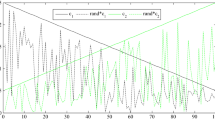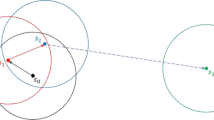Abstract
Particle swarm optimization (PSO) is a population-based swarm intelligence algorithm that falls under the category of nature-inspired algorithms and is similar to evolutionary computing in various ways. Rather than the survival of the fittest, the PSO is driven by a representation of a social psychological model inspired by the group behaviors of birds and other social species. The particle's position is modified in PSO based on its position as well as velocity, while in quantum mechanics, the trajectory idea is absurd; however, the uncertainty principle suggests that a particle's position, as well as velocity, cannot be determined simultaneously. As a result, an advanced version of the quantum mechanics-based PSO method is proposed. The study in this paper is focused on an investigation of a new quantum-behaved PSO (QPSO) method called Gaussian quantum-behaved particle swarm optimization (GQPSO), which uses a mutation operator with a Gaussian distribution and is inspired by classical PSO methods and quantum mechanics concepts. In GQPSO, inadequate control parameter tuning results in poor solutions. To better understand the effect of different control parameters and their implications on GQPSO results, this paper used a full parametric sensitivity analysis on five different problems (the Design of a pressure vessel, Tension/Spring Compression, Rastrigin function, Ackley function, and Constrained Box Volume Problem). By adjusting each parameter one at a time, different optimization problems were used to investigate GQPSO. As a result, to allow particles to change their earliest best solution based on viability, a constraint-handling mechanism was developed. The optimal parameter set for GQPSO is provided based on the analysis of the results. With the help of the proposed optimal parameter set (contraction–expansion coefficient values as (1 = 1.6,2 = 1.3), swarm size as ‘350’, and number of Iterations as ‘500’), GQPSO returned an optimized solution for Rastrigin and Ackley functions. It also performed better in the case of the design of a pressure vessel and tension/spring compression problems in comparison to the existing solution available in related literature. As per the findings of the sensitivity analysis, GQPSO is the most sensitive to the contraction-expansion coefficient in comparison to the maximum number of iterations (itermax) and swarm size (‘n’).



Similar content being viewed by others
Data availability
The authors confirm that the data supporting the findings of this study are available within the article.
References
Baykasoğlu A, Ozsoydan FB (2015) Adaptive firefly algorithm with chaos for mechanical design optimization problems. App soft comput 36:152–164
Ben Guedria N (2016) Improved accelerated PSO algorithm for mechanical engineering optimization problems. Appl Soft Comput J 40:455–467. https://doi.org/10.1016/j.asoc.2015.10.048
Coello CAC (2000) Use of a self-adaptive penalty approach for engineering optimization problems. Comput Ind 41(2):113–127
Coello Coello CA (2002) Theoretical and numerical constraint-handling techniques used with evolutionary algorithms: a survey of the state of the art. Comput Methods Appl Mech Eng 191(11–12):1245–1287. https://doi.org/10.1016/S0045-7825(01)00323-1
dos Coelho L, S. (2010) Gaussian quantum-behaved particle swarm optimization approaches for constrained engineering design problems. Expert Syst Appl 37(2):1676–1683. https://doi.org/10.1016/j.eswa.2009.06.044
Gaertner D, Clark K (2014) On optimal parameters for ant colony optimization algorithms. On Optimal Parameters for Ant Colony Optimization algorithms. October
Gandomi AH, Yang XS, Alavi AH (2013) Cuckoo search algorithm: a metaheuristic approach to solve structural optimization problems. Eng Comput 29:17–35. https://doi.org/10.1007/s00366-011-0241-y
He Q, Wang L (2007) An effective co-evolutionary particle swarm optimization for constrained engineering design problems. Eng appl Artif Intell 20(1):89–99. https://doi.org/10.1016/j.engappai.2006.03.003
He Q, Wang L (2007) A hybrid particle swarm optimization with a feasibility-based rule for constrained optimization. Appl Maths Comput 186(2):1407–1422. https://doi.org/10.1016/j.amc.2006.07.134
He S, Wu QH, Saunders JR (2009) Group search optimizer: an optimization algorithm inspired by animal searching behavior. IEEE Trans Evol Comput 13(5):973–990. https://doi.org/10.1109/TEVC.2009.2011992
Huang FZ, Wang L, He Q (2007) An effective co-evolutionary differential evolution for constrained optimization. Appl Maths Comput 186(1):340–356. https://doi.org/10.1016/j.amc.2006.07.105
Isiet M, Gadala M (2020) Sensitivity analysis of control parameters in particle swarm optimization. J Comput Sci 41:101086. https://doi.org/10.1016/j.jocs.2020.101086
Islam MJ, Tanveer MSR, Akhand MAH (2016) A comparative study on prominent nature inspired algorithms for function optimization. In: 2016 5th International Conference on Informatics, Electronics and Vision, ICIEV 2016, pp 803–808. https://doi.org/10.1109/ICIEV.2016.7760112
Jahed Armaghani D, Shoib RSNSBR, Faizi K, Rashid ASA (2017) Developing a hybrid PSO–ANN model for estimating the ultimate bearing capacity of rock-socketed piles. Neural Comput Appl 28(2):391–405. https://doi.org/10.1007/s00521-015-2072-z
Kannan BK, Kramer SN (1993) Augmented Lagrange multiplier based method for mixed integer discrete continuous optimization and its applications to mechanical design. In: American Society of Mechanical Engineers, Design Engineering Division (Publication) DE, 65 pt 2(June 1994), pp 103–112. https://doi.org/10.1115/DETC1993-0382
Karaboga D, Basturk B (2007) A powerful and efficient algorithm for numerical function optimization: artificial bee colony (ABC) algorithm. J Global Optim 39(3):459–471. https://doi.org/10.1007/s10898-007-9149-x
Kashan AH (2011) Computer-aided design an efficient algorithm for constrained global optimization and application to mechanical engineering design : league championship algorithm ( LCA ) ✩. Comput Aided Des 43(12):1769–1792. https://doi.org/10.1016/j.cad.2011.07.003
Kennedy J, Eberhart R (1995) Particle swarm optimization. pp 1942–1948.
Mirjalili S, Mirjalili SM, Lewis A (2014) Grey Wolf Optimizer. Adv Eng Softw 69:46–61. https://doi.org/10.1016/j.advengsoft.2013.12.007
Rizk-Allah RM (2018) Hybridizing sine cosine algorithm with multi-orthogonal search strategy for engineering design problems. J Comput Des Eng 5(2):249–273. https://doi.org/10.1016/j.jcde.2017.08.002
Rizk-Allah RM (2019) An improved sine–cosine algorithm based on orthogonal parallel information for global optimization. Soft Comput 23(16):7135–7161. https://doi.org/10.1007/s00500-018-3355-y
Rizk M. Rizk-Allah (2021) A quantum-based sine cosine algorithm for solving general systems of nonlinear equations. https://doi.org/10.1007/s10462-020-09944-0
Sadollah A, Bahreininejad A, Eskandar H, Hamdi M (2012) Mine blast algorithm: A new population based algorithm for solving constrained engineering optimization problems. Applied Soft Computing Journal. https://doi.org/10.1016/j.asoc.2012.11.026
Shi Y, Eberhart RC (1999) Empirical study of particle swarm optimization. In: Proceedings of the 1999 Congress on Evolutionary Computation, CEC 1999, 3,pp 1945–1950. https://doi.org/10.1109/CEC.1999.785511
Sun J, Fang W, Wu X, Palade V, Xu W (2012) Quantum-behaved particle swarm optimization: analysis of individual particle behavior and parameter selection. Evol Comput 20(3):349–393
Sun J, and Feng B (2004) A global search strategy of quantum-behaved particle swarm optimization. pp 1–3
Sun J, Feng B, Xu W (2004) Particle swarm optimization with particles having quantum behavior. In: Proceedings of the 2004 congress on evolutionary computation (IEEE Cat. No. 04TH8753) (Vol. 1, pp 325-331) IEEE
Sun J, Xu W, Liu J (2005) Parameter selection of quantum-behaved particle swarm optimization. In: Advances in Natural Computation: First International Conference, ICNC 2005, Changsha, China, August 27-29, 2005, Proceedings, Part III 1 (pp 543–552). Springer Berlin Heidelberg
Taylor P, Gandomi AH, Alavi AH (2015) Journal of Civil Engineering and Management An introduction of Krill Herd algorithm for engineering optimization. August. https://doi.org/10.3846/13923730.2014.897986
Wang Y, Cai Z, Zhou Y, Fan Z (2009) Constrained optimization based on hybrid evolutionary algorithm and adaptive constraint-handling technique. 0, 395–413. https://doi.org/10.1007/s00158-008-0238-3
Wang L, Li LP (2010) An effective differential evolution with level comparison for constrained engineering design. Struct Multidiscip Optim 41:947–963. https://doi.org/10.1007/s00158-009-0454-5
Yang X, Deb S, Behaviour ACB (2009) Cuckoo Search via L ´ evy Flights. Ieee, pp 210–214.
Yang XS (2009) Firefly algorithms for multimodal optimization. Lecture Notes in Computer Science (Including Subseries Lecture Notes in Artificial Intelligence and Lecture Notes in Bioinformatics), 5792 LNCS, pp 169–178. https://doi.org/10.1007/978-3-642-04944-6_14
Yang X (2014) Engineering optimization : an introduction with metaheuristic applications engineering.
Yazdani D, Nguyen TT, Branke J, Wang J (2017) A new multi-swarm particle swarm optimization for robust optimization over time. In: Applications of evolutionary computation: 20th European Conference, EvoApplications 2017, Amsterdam, The Netherlands, April 19–21, 2017, Proceedings, Part II 20 (pp. 99–109). Springer International Publishing
Zahara E, Kao Y (2009) Expert systems with applications hybrid Nelder–Mead simplex search and particle swarm optimization for constrained engineering design problems. Expert Syst Appl 36(2):3880–3886. https://doi.org/10.1016/j.eswa.2008.02.039
Zhang M, Luo W, Wang X (2008) Differential evolution with dynamic stochastic selection for constrained optimization. Inf Sci 178(15):3043–3074. https://doi.org/10.1016/j.ins.2008.02.014
Funding
No funding was received for conducting this study.
Author information
Authors and Affiliations
Corresponding author
Ethics declarations
Conflicts of interest
The authors have no conflicts of interest to declare that are relevant to the content of manuscript.
Ethics approval and consent to participate
This article does not contain any studies with human participants or animals performed by any of the authors.
Additional information
Publisher's Note
Springer Nature remains neutral with regard to jurisdictional claims in published maps and institutional affiliations.
Rights and permissions
Springer Nature or its licensor (e.g. a society or other partner) holds exclusive rights to this article under a publishing agreement with the author(s) or other rightsholder(s); author self-archiving of the accepted manuscript version of this article is solely governed by the terms of such publishing agreement and applicable law.
About this article
Cite this article
Rugveth, V.S., Khatter, K. Sensitivity analysis on Gaussian quantum-behaved particle swarm optimization control parameters. Soft Comput 27, 8759–8774 (2023). https://doi.org/10.1007/s00500-023-08011-4
Accepted:
Published:
Issue Date:
DOI: https://doi.org/10.1007/s00500-023-08011-4




